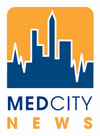Keywords:

A Mayo Clinic internist’s talk at the high-profile TEDWomen conference in Washington, D.C., outlined the stunning limitations of mammography for 30 to 60 percent of women (depending on age) and added fuel to her 10-year quest to offer a new, alternative screening technology.
Dr. Deborah Rhodes spoke in early December at TEDWomen, one of a series of events that highlights innovative thinkers and “ideas worth spreading.” Other cutting-edge leaders included Facebook Chief Operating Officer Sheryl Sandberg and Ugandan farmer Annet Namayanja, who’s created a new kind of protein-rich bean.
Since the speech was posted online late last week, it has become one of TEDWomen’s “most emailed” and has caused a deluge of interview requests, said a Mayo spokesperson.

In her talk, Rhodes zeroed in on the center of recent controversy and confusion over mammogram guidelines: breast density.
- Breast tissue density is a higher risk for breast cancer than having a mother or sister with the disease, but 95 percent of women don’t know this, or how dense their breast tissue is.
- Mammography has only a 40 percent chance of detecting early stage tumors, like dense tissue, are white on a mammogram image.
- Molecular Breast Imaging (MBI) technology, currently licensed to California’s Gamma Medica, catches three times as many tumors in breasts with dense tissue, using significantly lower levels of radiation than currently offered by other gamma screening cameras. It also costs about $500, compared to more than $1,100 for an MRI.
“It is time for us to accept both the extraordinary successes of mammography and the limitations,” Rhodes said, issuing a challenge to the interests that would protect the status quo. “We need to individualize screening based on density.”
An Unanswerable Question
Ten years ago breast density was little understood, but Rhodes learned enough to realize she could not offer an at-risk patient a definitive early diagnosis with a mammogram. She then teamed up with Michael O’Connor, a professor of radiologic physics at Mayo Clinic. His team designed a type of scanner using a gamma camera, which produces images from a gamma radiation-emitting radioisotope that is injected. Gamma camera technology had just been made small enough to fit onto a mammography plate, which was what the team used for its first prototype.
When injected, the radioisotope concentrates in active clusters of cells, or tumors, which show up as black dots on the image. Mayo quickly got great results testing the technology, catching more and much smaller tumors than mammograms. In 2004, the Susan G. Komen Foundation funded a study of 1,000 women with dense breasts comparing a screening mammogram to MBI. Of the tumors found, MBI caught 83 percent, while mammogram caught only 25 percent.
The Competition
In 2004, while the Mayo team was conducting its study, Dilon Diagnostics, based in Newport News, Virginia, began selling its own gamma screening units. The clarity of gamma scans makes it easier to plan surgery or see if chemotherapy administered before surgery is shrinking a tumor. The technology has its own name — breast-specific gamma imaging, or BSGI. Nancy Morter, director of marketing and communications, said Dilon has installations in about 150 clinics in the U.S. as well as several other countries.
The Downside
Radiation levels are the key concern for MBI, BSGI, and related therapies. Because the radioisotope is injected, all organs are exposed instead of just the breasts. Radiation levels in scans are the subject of ongoing controversy, because nobody really knows for sure the true risk they pose. “If you don’t have dense breasts or other risk factors, then you don’t want the radiation exposure — you don’t need this,” Morter said.
Getting that dose as low as possible is the goal for Rhodes and her team, and MBI is currently one-fifth the level of other gamma technologies, or “comparable to a mammogram,” states the Gamma Medica site. The Mayo team will be publishing studies that attempt to weigh MBI’s potential against its risks as a regular annual screening tool for women with dense breast tissue.
The Market
A 2009 Elsevier Business Intelligence report valued the U.S. market for breast cancer detection and diagnostic technologies at approximately $2.18 billion in 2008, estimated to climb to $2.84 billion by 2013. But all gamma imaging technologies, at the time of the report, were considered too new and experimental to be included. Gamma Medica did not return a call for comment, but Morter of Dilon Diagnostics said there are about 9,000 U.S. Mammography Quality Standard Act-certified centers, plus independent imaging centers, and about 10,000 abroad as well. “Asian markets really like this (BSGI) device, as well as other countries with socialized medicine,” Morter said. “It is very affordable and easily accessed.” BSGI systems cost about $300,000 each for just the capital equipment.
The Future
Gamma Medica has been selling its Lumagem molecular breast imaging system with Mayo technology since 2009, but no sales figures are known; in her talk Rhodes said it was “still not widely available.” (Rhodes does not profit financially from the technology.) Given that replication of its studies will take years, and that the medical industry as a whole is slow to change, it’s anybody’s guess whether MBI or some other “disruptive” technology — or technologies — will improve early breast cancer screening.
Until MBI or other alternatives such as a new test that will better quantify density are more widely employed, both Rhodes and Morter say, it’s up to women to ask about their breast density classification when they get screened.

